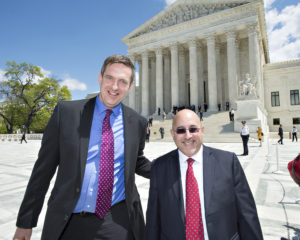Tag: marriage
Freedom to Marry Oral History Project
The Freedom to Marry Oral History Project
In the historically swift span of roughly twenty years, support for the freedom to marry for same-sex couples went from an idea a small portion of Americans agreed with to a cause supported by virtually all segments of the population. In 1996, when Gallup conducted its first poll on the question, a seemingly insurmountable 68% of Americans opposed the extension of marriage rights. In a historic reversal, fewer than twenty years later several polls found that over 60% of Americans had come to support the freedom to marry nationwide. The rapid increase in support mirrored the progress in securing the right to marry coast to coast. Before 2004, no state issued marriage licenses to same-sex couples. By spring 2015, thirty-seven states affirmed the freedom to marry for same-sex couples, with a number of states extending marriage through votes in state legislatures or at the ballot box. The discriminatory federal Defense of Marriage Act, passed in 1996, denied legally married same-sex couples the federal protections and responsibilities afforded married different-sex couples—a double-standard corrected when a core portion of the act was overturned by the U.S. Supreme Court in 2013 in United States v. Windsor. The full national resolution came in June 2015 when, in Obergefell v. Hodges, the U.S. Supreme Court ruled that the Constitution’s guarantee of the fundamental right to marry applies equally to same-sex couples.
The Oral History Center is thrilled to release to the public the first major oral history project documenting the vast shift in public opinion about marriage, the consequential reconsideration of our nation’s laws governing marriage, and the actions of individuals and organizations largely responsible for these changes. The Freedom to Marry Oral History Project produced 23 interviews totaling nearly 100 hours of recordings. Interviewees include: Evan Wolfson, founder of Freedom to Marry; Kate Kendell, executive director of the National Center for Lesbian Rights; James Esseks, director of the ACLU’s LGBT & HIV project; and Thalia Zepatos, the movement’s “message guru” who worked at Freedom to Marry as director of research and messaging. Read on for video clips of the interviews and links to complete interview transcripts.

At the center of the effort to change hearts and minds, prevail in the courts and legislatures, win at the ballot, and win at the Supreme Court was Freedom to Marry, the national campaign launched by Harvard-trained attorney Evan Wolfson in 2003. Freedom to Marry’s national strategy focused from the beginning on setting the stage for a nationwide victory at the Supreme Court. Working with national and state organizations and allied individuals and organizations, Freedom to Marry succeeded in building a critical mass of states where same-sex couples could marry and a critical mass of public support in favor of the freedom to marry. This oral history project focuses on the pivotal role played by Freedom to Marry and their closest state and national organizational partners, as they drove the winning strategy and inspired, grew, and leveraged the work of a multitudinous movement.
Freedom to Marry Oral History Project Interview Transcripts:
Barbara Cox, “Barbara Cox on Marriage Law and the Governance of Freedom to Marry.”
Michael Crawford, “Michael Crawford on the Digital Campaign at Freedom to Marry.”
Scott Davenport, “Scott Davenport on Administration and Operations at Freedom to Marry.”
Jo Deutsch, “Jo Deutsch and the Federal Campaign.”
Sean Eldridge, “Sean Eldridge on Politics, Communications, and the Freedom to Marry.”
James Esseks, “James Esseks on the Legal Strategy, the ACLU, and LGBT Legal Organizations.”
Harry Knox, “Harry Knox on the Early Years of Freedom to Marry.”
Matt McTighe, “Matt McTighe on the Marriage Campaigns in Massachusetts and Maine.”
Amy Mello, “Amy Mello and Field Organizing in Freedom to Marry.” (forthcoming)
John Newsome, “John Newsome on And Marriage for All.”
Kevin Nix, “Kevin Nix on Media and Public Relations in the Freedom to Marry Movement.”
Bill Smith, “Bill Smith on Political Operations in the Fight to Win the Freedom to Marry.”
Marc Solomon, “Marc Solomon on Politics and Political Organizing in the Freedom to Marry Movement.” (forthcoming)
Tim Sweeney, “Tim Sweeney on Foundations and the Freedom to Marry Movement.”
Cameron Tolle, “Cameron Tolle on the Digital Campaign at Freedom to Marry.”
Thomas Wheatley, “Thomas Wheatley on Field Organizing with Freedom to Marry.”
Evan Wolfson, “Evan Wolfson on the Leadership of the Freedom to Marry Movement.”
Thalia Zepatos, “Thalia Zepatos on Research and Messaging in Freedom to Marry.”
